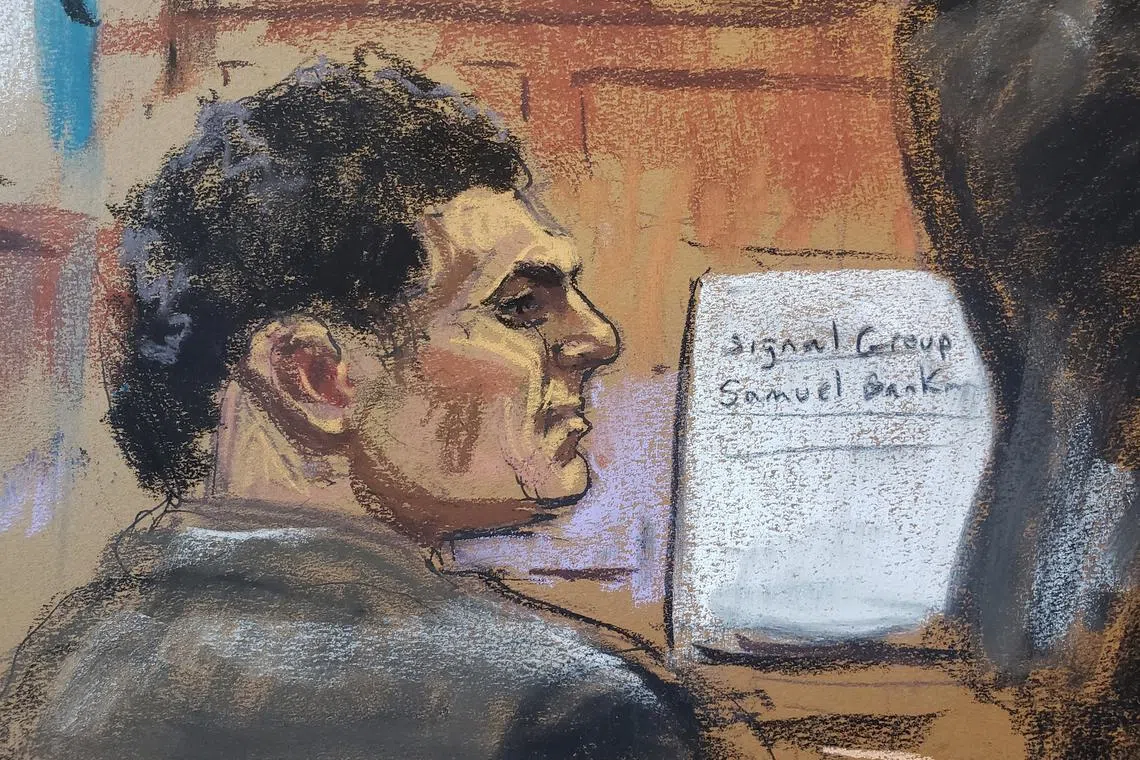FTX founder Sam Bankman-Fried testifies outside jury's presence
Sign up now: Get ST's newsletters delivered to your inbox

FTX founder Sam Bankman-Fried was called to the stand after the defence presented its first two witnesses.
PHOTO: REUTERS
Follow topic:
NEW YORK – Sam Bankman-Fried, founder of the now-bankrupt cryptocurrency exchange FTX, testified in his fraud trial on Thursday without the jury present so the judge overseeing the case can first decide what portions of his testimony are admissible.
US District Judge Lewis Kaplan’s decision came after prosecutors finished presenting their case accusing Bankman-Fried of stealing billions of dollars
The judge released the jury for the rest of the day following a lunch break.
Bankman-Fried briefly sat at the witness stand before the trial resumed, then returned to the defence table.
The prosecution rested its case after presenting 12 days of testimony in federal court in Manhattan in which former close FTX colleagues told the jury he directed them to divert customer funds to his hedge fund and lie to investors and lenders.
Bankman-Fried’s risky decision to testify gives prosecutors the chance to cross-examine the 31-year-old former billionaire about those claims that he told colleagues to commit crimes.
Bankman-Fried was called to the stand after the defence presented its first two witnesses: Bankman-Fried’s lawyer in the Bahamas Krystal Rolle and database expert Joseph Pimbley.
Bankman-Fried has pleaded not guilty to two counts of fraud and five counts of conspiracy.
If convicted, he could face decades in prison.
Prosecutors have said Bankman-Fried used the misappropriated funds to prop up his crypto-focused hedge fund, Alameda Research, make speculative venture investments and donate more than US$100 million (S$136.9 million) to US political campaigns.
His lawyers have said three of his former colleagues, who have pleaded guilty and agreed to cooperate with prosecutors, tailored their testimony to implicate Bankman-Fried
Defence lawyer Mark Cohen said Bankman-Fried’s direct testimony could last close to five hours, before prosecutors get a chance to cross-examine him.
After the prosecution rested its case, Judge Kaplan denied a defence request to acquit Bankman-Fried before the case goes to the jury.
Mr Cohen argued that prosecutors had not set forth “viable legal theories” of wire fraud, which prosecutor Nicolas Roos disputed.
The final prosecution witness, Federal Bureau of Investigation agent Marc Troiano, testified about Bankman-Fried’s use of the encrypted messaging application Signal when the trial resumed on Thursday morning after a week-long break.
Troiano said Signal groups that Bankman-Fried was in with colleagues often were set to delete messages automatically, as jurors saw screenshots from a phone belonging to Caroline Ellison, the former chief executive of Bankman-Fried’s Alameda Research hedge fund and his on-and-off girlfriend.
Ellison previously testified that Bankman-Fried directed employees to “be careful with what we put in writing, and not put into writing something that could get us into legal trouble”.
Bankman-Fried has maintained that while he made mistakes running FTX, he never intended to steal funds.
Legal experts have said Bankman-Fried has little to lose by bucking conventional wisdom and testifying, given weeks of the testimony against him by insiders painting an unflattering portrait of his character.
First defense witnesses
Mrs Rolle, the first defence witness, testified that the day after FTX declared bankruptcy on Nov 11, 2022, the authorities in the Bahamas – where FTX was based – directed Bankman-Fried to hand over remaining assets to regulators in the Caribbean country.
The defence could argue that Mrs Rolle’s account undercuts prosecution testimony from Gary Wang, FTX’s former chief technology officer, that Bankman-Fried told him he transferred assets to the Bahamas because “they seemed more likely to let him stay in control of the company, compared with the US”.
Dr Pimbley, the second defence witness, testified that most FTX customers had a type of account that allowed their funds to be lent to other users.
Bankman-Fried’s lawyers could argue that shows that Alameda’s use of FTX customer funds was not improper.
The judge at several points urged prosecutor Thane Rehn to speed up his cross-examination of Dr Pimbley, at one point alluding to being tasked with measuring smoked fish while working at his father’s deli as a child.
“It means pastrami is not included, neither is coleslaw nor macaroni salad,” Judge Kaplan said.
Judge Kaplan said some of Bankman-Fried’s testimony would take place outside the jury’s presence, so he can decide whether it is admissible as evidence.
That would include any testimony about the involvement of FTX lawyers in structuring loans from Alameda to FTX executives, which prosecutors have said was a key way the defendant and others took funds from unwitting customers.
Prosecutors have said Alameda looted FTX funds through special trading privileges on the exchange.
They may ask Bankman-Fried during cross-examination about why he did not disclose Alameda’s privileges to FTX customers or equity investors, and why he posted on social media in the midst of a wave of customer withdrawals in November 2022 that FTX was “fine” when he knew it was short billions of dollars in funds. REUTERS

